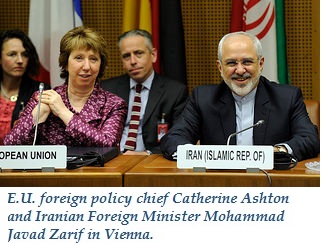 On July 18, Iran and the world’s six major powers agreed to a four-month extension of nuclear talks after nearly three weeks of intensive discussion. Foreign Minister Mohammad Javad Zarif said that although the two sides “have made tangible progress on some of the issues… there are still significant gaps on some core issues which will require more time and effort.”
On July 18, Iran and the world’s six major powers agreed to a four-month extension of nuclear talks after nearly three weeks of intensive discussion. Foreign Minister Mohammad Javad Zarif said that although the two sides “have made tangible progress on some of the issues… there are still significant gaps on some core issues which will require more time and effort.”
The extension continues all of the commitments laid down in the interim agreement. But in addition, Iran has agreed to speed up its conversion of 20 percent uranium oxide into nuclear fuel and to dilute its up to two percent stockpile. Tehran has also confirmed that it will only produce advanced centrifuges to replace damaged machines under the interim agreement. The following are remarks by Iranian officials on the extension.
Joint Press Statement by EU High Representative Catherine Ashton and Iranian Foreign Minister Mohammad Javad Zarif
July 19, 2014
“We, together with the Political Directors of the E3+3 (China, France, Germany, Russia, the United Kingdom and the United States), have worked intensively towards a Joint Comprehensive Plan of Action, building on the political momentum created by the adoption and smooth implementation by both sides of the Joint Plan of Action agreed on 24 November 2013. We are grateful to the Austrian government and the United Nations for their tremendous support in hosting these negotiations in Vienna.
“We have held numerous meetings in different formats, and in a constructive atmosphere, to reach a mutually agreed long-term comprehensive solution that would ensure Iran's nuclear programme will be exclusively peaceful.
“During the past few weeks, we have further intensified our efforts, including through the active involvement of E3+3 Foreign Ministers or their Vice Ministers, who came to Vienna on 13 July 2014 to take stock of progress in the talks. While we have made tangible progress on some of the issues and have worked together on a text for a Joint Comprehensive Plan of Action, there are still significant gaps on some core issues which will require more time and effort.
“We, together with the Foreign Ministers of the E3+3, have therefore decided to extend the implementation of measures of the Joint Plan of Action until 24 November 2014, in
line with the timeframe that we envisaged in the Joint Plan of Action. Iran and the E3/EU+3 reaffirm that they will continue to implement all their commitments described in the Joint Plan of Action in an efficient and timely manner.
“We will reconvene in the coming weeks in different formats with the clear determination to reach agreement on a Joint Comprehensive Plan of Action at the earliest possible moment.”
Deputy Foreign Minister Abbas Araghchi
“A total of $2.8 billion will be paid to Iran in six installments in the next four months.”
July 19, 2014
Parliament’s National Security and Foreign Policy Committee Alaeddin Boroujerdi
“The message [conveyed] to the public opinion from the extension of the Vienna talks is that the sides have the will to reach a comprehensive and final agreement. We decided to achieve an agreement for the sake of defending our nation's nuclear rights.
“But this definitely does not mean that we would change our positions in the next four months.”
July 20, 2014, according to the press
